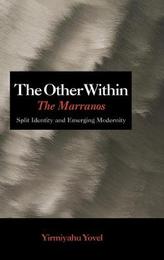
|
The Other Within: The Marranos: Split Identity and Emerging Modernity
Hardback
Main Details
| Title |
The Other Within: The Marranos: Split Identity and Emerging Modernity
|
| Authors and Contributors |
By (author) Yirmiyahu Yovel
|
| Physical Properties |
| Format:Hardback | | Pages:512 | | Dimensions(mm): Height 235,Width 152 |
|
| Category/Genre | History of religion |
|---|
| ISBN/Barcode |
9780691135717
|
| Classifications | Dewey:946.004924 |
|---|
| Audience | | Tertiary Education (US: College) | | Professional & Vocational | |
|---|
|
Publishing Details |
| Publisher |
Princeton University Press
|
| Imprint |
Princeton University Press
|
| Publication Date |
25 January 2009 |
| Publication Country |
United States
|
Description
The Marranos were former Jews forced to convert to Christianity in Spain and Portugal, and their later descendents. Despite economic and some political advancement, these "Conversos" suffered social stigma and were persecuted by the Inquisition. In this unconventional history, Yirmiyahu Yovel tells their fascinating story and reflects on what it means for modern forms of identity. He describes the Marranos as "the Other within"--people who both did and did not belong. Rejected by most Jews as renegades and by most veteran Christians as Jews with impure blood, Marranos had no definite, integral identity, Yovel argues. The "Judaizers"--Marranos who wished to remain secretly Jewish--were not actually Jews, and those Marranos who wished to assimilate were not truly integrated as Hispano-Catholics. Rather, mixing Jewish and Christian symbols and life patterns, Marranos were typically distinguished by a split identity. They also discovered the subjective mind, engaged in social and religious dissent, and demonstrated early signs of secularity and this-worldliness. In these ways, Yovel says, the Marranos anticipated and possibly helped create many central features of modern Western and Jewish experience. One of Yovel's philosophical conclusions is that split identity--which the Inquisition persecuted and modern nationalism considers illicit--is a genuine and inevitable shape of human existence, one that deserves recognition as a basic human freedom. Drawing on historical studies, Inquisition records, and contemporary poems, novels, treatises, and other writings, this engaging critical history of the Marrano experience is also a profound meditation on dual identities and the birth of modernity.
Author Biography
Yirmiyahu Yovel is the Hans Jonas Professor of Philosophy at the New School for Social Research and chairman of the Jerusalem Spinoza Institute. He has written widely on philosophy and history, and his books include "Spinoza and Other Heretics" (Princeton); "Kant and the Philosophy of History" (Princeton); and "Dark Riddle: Hegel, Nietzsche, and the Jews".
Reviews"The Other Within remains a brilliant reappraisal of modernity's birth."--Giulia F. Miller, Times Higher Education "Impressive and detailed, The Other Within will ... leave many questions unanswered for new generations intrigued by its subject."--Jewish Book World "Here we have a respected author who makes a mammoth endeavour to unravel the long Saga and minds of the Marranos... One can only give praise for the delving efforts, of this lengthy book."--Gloria Mound, Casa Shalom Members Journal "Yovel tackles in considerable depth how the mass conversions of the Jews enforced a psychological duality... Yovel's efforts of historical research are remarkable."--Gloria Mound, European Legacy "[E]rudite and comprehensive study... With a literary style that exhibits clarity of purpose interlaced with passion, Yirmiyahu Yovel supports his thesis with a series of scholarly portraits based on contemporary trial records, personal stories, prayers, customs, and popular poems."--Paulette L. Pepin, Historian "This book is a major contribution to the field of Marrano studies, following on previous major academic studies."--Judith Oumani, Sephardic Horizons "[T]his is a captivating synthesis that reveals much about religious identity and mentality on the eve of modernity."--Gary K. Waite, Canadian Journal of History
|